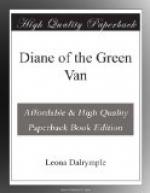“But—” stammered Diane.
“They will think,” explained Keela shyly, “that you are a beautiful daughter of the sun from the wilderness of O-kee-fee-ne-kee. You are brown and beautiful. Such, they tell, was my grandmother. It is a legend of my mother’s people, but I do not think,” added Keela majestically, “that the wild and beautiful tribe of mystery who were sons and daughters of the Sun, are half so beautiful as you!”
To the dull baying of the alligators in the saw grass, and the melancholy croak of the great blue herons, Keela’s wagon penetrated the weird and terrible wilds of the Everglades, winding by the gloomy border of swamps where the deadly moccasin dwelt beneath the darkling shadow of cypress, on by ponds thick with lilies and tall ghostly grasses, over tangled underbrush, past water-dark jungles of dead trees where the savage cascade of brush and vine and fallen branches had woven a weird, wild lacery among the trees, through mud and saw grass, past fertile islands and lagoons of rush and flag—a trackless water-prairie of uninhabitable wilds which to Keela’s keen and beautiful eyes held the mysteriously blazed home-trail of the Seminole.
As Keela knew the trail, so surely from the rank, tropical vegetation of the great Southern marshland she knew the art of wresting food. Bitter wild oranges, pawpaws, oily palmetto cabbage, wild cassava, starred gorgeously now with orange colored blossoms, and guavas; these, with the wild turkeys and mallard ducks, turtles and squirrels and the dark little Florida quail with which the wild abounded, gave them varied choice.
Cheerfully fording miles of mud and water, his discomforts not a few, came Philip, greatly disturbed by the incomprehensible whims of his lady. By day he followed close upon the trail of the canvas wagon, patterning his conquest of the aquatic wilderness about him after that of Keela, hunting the wild duck and the turkey and discarding the bitter orange with aggrieved disgust. And if Keela occasionally found a brace of ducks by the camp fire or a bass in a nest of green palmetto, she wisely said nothing, sensing the barrier between these two and wondering greatly.
By night when the great morass lay in white and sinister tangle under the wild spring moon, when the dark and dreadful swamps were rife with horrible croaks and snaps, the whirring of the wings of waterfowl or the noise of a disturbed puff adder, Philip stretched himself upon the seat of the music-machine and slept through the twilight and the early evening. When the camp ahead, glimmering brightly through the live oaks, was silent, Philip awoke and watched and smoked, a solitary sentinel in the terrible melancholy of the moonlit waste of ooze and dead leaf and sinister crawling life.
So they came in time to the plains of Okeechobee and thence to the wild, dark waters of the great inland sea—a wild, bleak sea, mirroring cloud and the night-lamp of the Everglades. The wind wafting across on night-tipped wings rippled the great water shield and brought its message to the silent figure on the shore.




